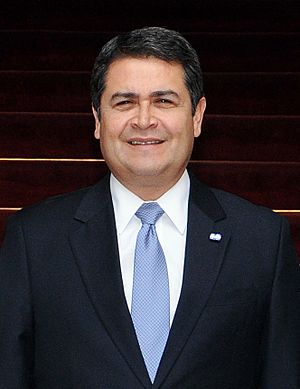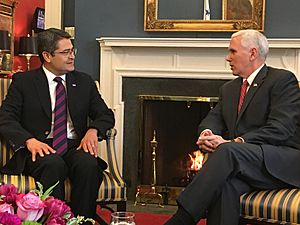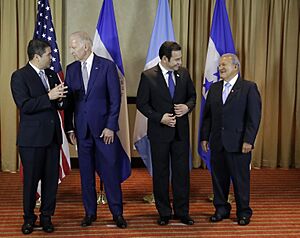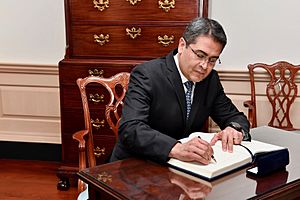Juan Orlando Hernández facts for kids
Quick facts for kids
Juan Orlando Hernández
|
|
|---|---|

Hernández in 2018
|
|
| 38th President of Honduras | |
| In office 27 January 2014 – 27 January 2022 |
|
| Vice President |
|
| Preceded by | Porfirio Lobo Sosa |
| Succeeded by | Xiomara Castro |
| President of the National Congress | |
| In office 25 January 2010 – 25 January 2014 |
|
| Vice President | Lena Gutiérrez |
| Preceded by | José Alfredo Saavedra (acting) |
| Succeeded by | Mauricio Oliva |
| Deputy of the Lempira Department | |
| In office 25 January 1998 – 25 January 2014 |
|
| Personal details | |
| Born |
Juan Orlando Hernández Alvarado
28 October 1968 Gracias, Lempira, Honduras |
| Political party | National Party |
| Spouse |
Ana García Carías
(m. 1990) |
| Children | 4 |
| Relatives |
|
| Alma mater | National Autonomous University of Honduras (BL) |
Juan Orlando Hernández Alvarado (born 28 October 1968), often called JOH, is a Honduran lawyer and former politician. He served as the 38th president of Honduras for two terms, from 27 January 2014 to 27 January 2022. He was a member of the National Party.
Before becoming president, Hernández was the president of the National Congress of Honduras. After his presidency, he faced legal challenges. In February 2022, the U.S. government requested his extradition. He was then sent to the United States to face legal proceedings. In March 2024, he was found responsible for certain actions and received a prison sentence in June 2024.
Contents
Who is Juan Orlando Hernández?
Juan Orlando Hernández was born in Gracias, Honduras on October 28, 1968. He was one of seventeen children born to Juan Hernández Villanueva and Elvira Alvarado Castillo. His siblings include Hilda Hernández and Tony Hernández.
Early Life and Education
Hernández earned a master's degree in public administration from the State University of New York at Albany. He also studied law at the National Autonomous University of Honduras. Before his political career, he worked as a coffee farmer in his hometown of Gracias.
Journey to the Presidency
Juan Orlando Hernández had a long career in Honduran politics. He represented the Lempira Department in the National Congress for many years.
Leading the National Congress
On 21 January 2010, Hernández was elected President of the National Congress. His political party, the National Party, held a strong majority in Congress at that time. He served in this role until June 2013. He then took a break from his duties to focus on his campaign for president.
Presidential Campaigns and Elections
In 2012, Hernández sought to become his party's candidate for president. He won the internal election in November 2012. In May 2013, early polls showed him as a strong contender.
He officially began his presidential campaign in July 2013. His campaign was called El Pueblo Propone, which means "The People Propose" in English. He promised to use the military to help keep streets safe. He won the election, becoming president. Later, there were discussions about some campaign funds linked to a financial issue at the Honduran Social Security Institute.
In 2017, Hernández sought re-election. The Supreme Court had allowed presidents to run for a second term in 2015. He won his party's primary election in March 2017. The 2017 Honduran general election in November 2017 was very close. Hernández was declared the winner, but there were concerns about the election process from some international observers.
As President of Honduras (2014–2022)
Juan Orlando Hernández served as President of Honduras for two terms. His presidency lasted from 27 January 2014 to 27 January 2022.
Public Concerns and Protests
During his presidency, people in Honduras sometimes held protests. They expressed concerns about how public money was managed and asked for changes in government. There were discussions about some funds received by his political party. President Hernández stated he had no personal knowledge of any wrongdoing. He also set up a group to look into these concerns.
In 2018 and 2019, more protests happened, involving students and healthcare workers. These events sometimes led to clashes. President Hernández ordered military police to help manage the situation in the capital city.
Social Policies and Family Values
During his time as president, there was a focus on traditional social values. The government introduced policies that encouraged prayer in schools and public institutions. In 2021, the country's Constitution was updated to include strong protections for traditional family definitions and the sanctity of life. These changes made it very difficult to alter these laws in the future.
Online Information Concerns
From June to July 2018, there were concerns about how social media was used to show support for President Hernández. It was found that many of his Facebook posts received artificial engagement. This made his popular support appear much higher than it actually was. The person managing his official Facebook pages was linked to creating many of these fake interactions.
International Relations


President Hernández maintained good relationships with the United States during both the Obama and Trump administrations. He was seen as an important ally in Central America.
In 2019, during a political situation in Venezuela, Hernández recognized Juan Guaidó as the legitimate president. He also joined other countries in the Lima Group in their statements regarding the Venezuelan government.
In 2021, Hernández visited Israel and met with Prime Minister Naftali Bennett. During this trip, Honduras opened its embassy in Jerusalem. This made Honduras one of the countries that officially recognize Jerusalem as the capital of Israel.
Shortly before leaving office in October 2021, Hernández met with President Daniel Ortega of Nicaragua. They signed agreements about disputes in the Caribbean Sea and the Gulf of Fonseca. This meeting was seen as surprising by some, given their past differences.
Personal Life
Juan Orlando Hernández married Ana García Carías on 3 February 1990. They have three children together. His brother is Tony Hernández.
Honors
- Order of Brilliant Jade with Grand Cordon (Republic of China)
See also
 In Spanish: Juan Orlando Hernández para niños
In Spanish: Juan Orlando Hernández para niños
 | Chris Smalls |
 | Fred Hampton |
 | Ralph Abernathy |


